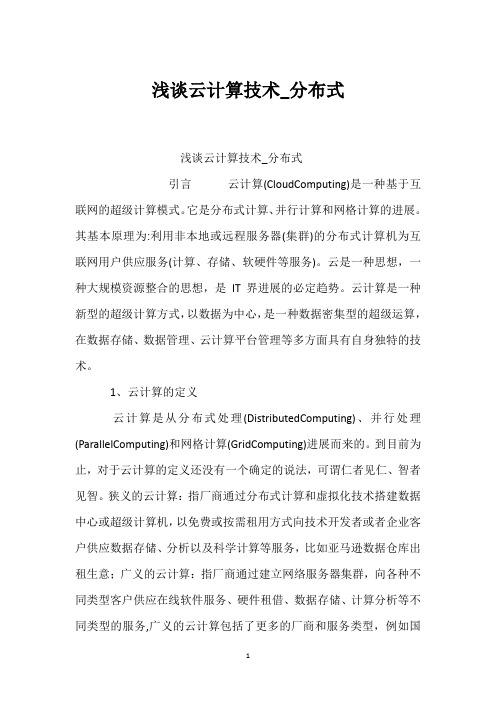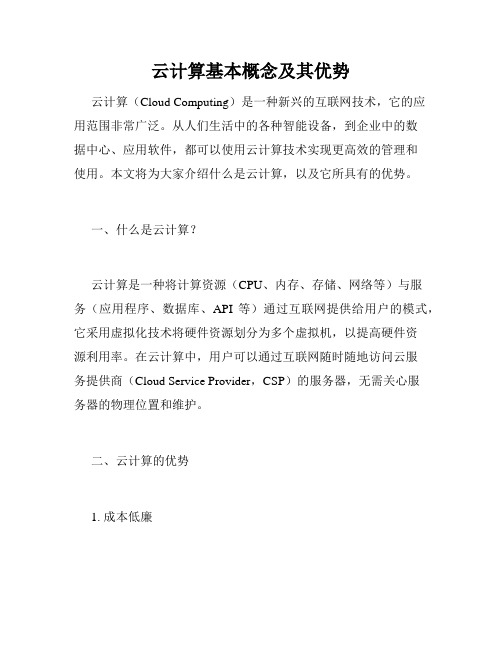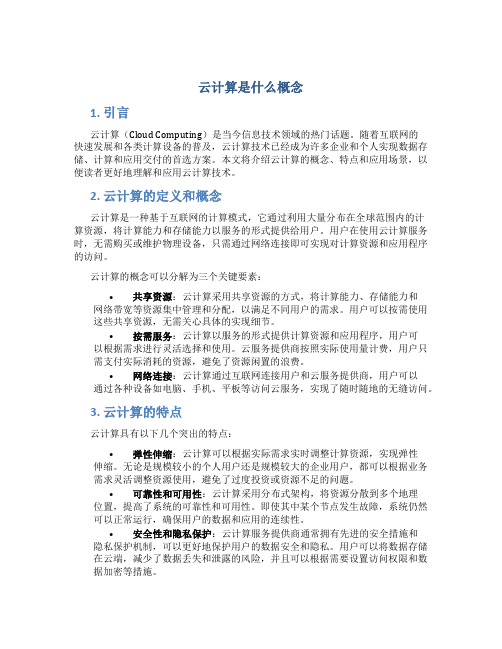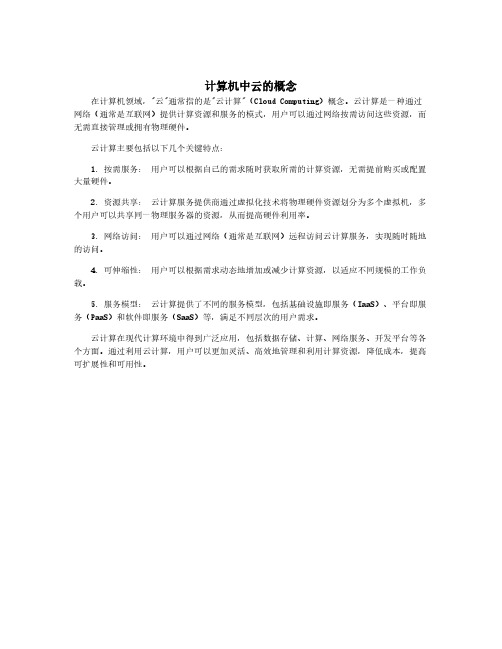Cloud Computing(浅谈云计算)
云计算的基本定义

云计算的基本定义云计算(Cloud Computing)是一种通过互联网或专用网络,根据用户需求,实时提供按需、弹性可扩展且可自助使用的计算资源和服务的模式。
它是一种基于虚拟化技术的新型计算模式,通过将计算、存储和数据处理等资源进行集中管理和调度,提供给用户高效、便捷的计算能力。
云计算的核心概念是“云”,它代表着一个共享资源池,其中包含了大量的计算资源(如服务器、存储设备等),通过虚拟化技术将这些资源进行管理和分配。
用户可以通过互联网或专用网络,根据自己的需求从云中获取所需的计算资源,并且可以根据需求的变化自由地调整使用的资源规模。
云计算的基本定义涉及以下几个方面:1. 弹性可扩展性(Elasticity and Scalability):云计算提供了弹性可扩展的资源,能够根据用户的需求自动分配和释放计算资源。
用户可以根据业务需求,动态调整所使用的计算资源规模,无需预先部署硬件设备或进行大量的人工干预。
2. 按需服务(On-demand Service):云计算以服务的形式向用户提供计算资源,并按照实际使用情况计费。
用户可以根据业务需求随时获取所需的计算资源,而无需担心资源的供应问题。
3. 自助服务(Self-service):云计算模式下,用户可以根据自身需要,通过界面或API等方式自助完成资源申请和管理任务。
用户无需依赖运维人员的介入,可以自主完成各种操作。
4. 共享资源池(Shared Resource Pool):云计算将大量的计算资源进行集中管理和分配,形成一个共享资源池。
用户可以从中获取所需的计算能力,而不需要自己持有和维护硬件设备。
云计算的基本定义使得用户不再需要购买昂贵的硬件设备,也不需要花费大量的时间和精力来维护和管理这些设备。
云计算通过将计算资源进行集中管理和提供,为用户提供了一种高效、灵活、可靠的资源获取方式。
用户只需要通过互联网或专用网络,按需获取所需的计算能力,并根据业务需求灵活调整资源使用规模。
云计算基本概念

云计算基本概念云计算(Cloud Computing)是一种基于互联网的计算模式,通过网络将计算资源、数据存储和应用程序提供给用户。
它是一种灵活、可扩展、高效、安全的计算方式,已经成为现代信息技术领域的重要发展方向。
本文将介绍云计算的基本概念,包括云计算的定义、特点、服务模型和部署模型。
一、云计算的定义云计算是一种通过互联网提供计算资源和服务的模式。
它基于虚拟化技术,将计算资源以服务的形式交付给用户,用户可以随需求按使用量进行付费。
云计算实现了资源的共享和动态分配,使用户能够快速获取所需的计算能力,提高了资源利用率和灵活性。
二、云计算的特点1.弹性伸缩:云计算可以根据用户的需求进行弹性扩展或收缩。
用户可以根据业务量的变化,灵活调整计算资源的规模,避免了过度投入或资源浪费的问题。
2.按需自助服务:用户可以根据需求自行选择和使用云计算服务,无需提前申请或等待审批。
用户可以随时随地进行资源订购、配置和使用,提高了效率和便捷性。
3.资源共享:云计算通过虚拟化技术将物理资源进行资源池化,用户可以共享这些资源。
不同用户之间可以按需共享计算资源,提高了资源利用率,降低了成本。
4.高可用性和可靠性:云计算采用分布式架构,通过冗余和备份机制保证了服务的可用性和可靠性。
即使某一台服务器发生故障,用户的服务也可以通过其他服务器保持运行。
三、云计算的服务模型1.基础设施即服务(Infrastructure as a Service,IaaS):IaaS提供了基础的计算资源,包括虚拟机、存储和网络等。
用户可以根据需要创建和管理虚拟机,存储和网络资源,具备最大的自由度和灵活性。
2.平台即服务(Platform as a Service,PaaS):PaaS提供了应用程序开发和部署的平台环境,包括开发工具、编程语言和运行时环境等。
用户可以基于PaaS平台开发和部署自己的应用程序,而无需关注底层的基础设施。
3.软件即服务(Software as a Service,SaaS):SaaS是一种基于云计算的软件交付模式,用户通过互联网访问和使用云端提供的应用程序。
云计算的认识和理解

云计算认识与理解电子商务1491 2 陈婷娟一、云计算根本概念与原理云计算〔cloud computing,分布式计算技术一种,其最根本概念,是透过网络将庞大计算处理程序自动分拆成无数个较小子程序,再交由多部效劳器所组成庞大系统经搜寻、计算分析之后将处理结果回传给用户。
稍早之前大规模分布式计算技术即为“云计算〞概念起源。
云计算根本原理是,通过使计算分布在大量分布式计算机上,而非本地计算机或远程效劳器中,企业数据中心运行将更与互联网相似。
这使得企业能够将资源切换到需要应用上,根据需求访问计算机与存储系统。
二、云计算特点(1) 超大规模“云〞具有相当规模,Google云计算已经拥有100多万台效劳器,Amazon、IBM、微软、Yahoo等“云〞均拥有几十万台效劳器。
企业私有云一般拥有数百上千台效劳器。
“云〞能赋予用户前所未有计算能力。
(2) 虚拟化云计算支持用户在任意位置、使用各种终端获取应用效劳。
所请求资源来自“云〞,而不是固定有形实体。
应用在“云〞中某处运行,但实际上用户无需了解、也不用担忧应用运行具体位置。
只需要一台笔记本或者一个手机,就可以通过网络效劳来实现我们需要一切,甚至包括超级计算这样任务。
(3) 高可靠性“云〞使用了数据多副本容错、计算节点同构可互换等措施来保障效劳高可靠性,使用云计算比使用本地计算机可靠。
(4) 通用性云计算不针对特定应用,在“云〞支撑下可以构造出千变万化应用,同一个“云〞可以同时支撑不同应用运行。
(5) 高可扩展性“云〞规模可以动态伸缩,满足应用与用户规模增长需要。
(6) 按需效劳“云〞是一个庞大资源池,你按需购置;云可以像自来水,电,煤气那样计费。
(7) 极其廉价由于“云〞特殊容错措施可以采用极其廉价节点来构成云,“云〞自动化集中式管理使大量企业无需负担日益高昂数据中心管理本钱,“云〞通用性使资源利用率较之传统系统大幅提升,因此用户可以充分享受“云〞低本钱优势,经常只要花费几百美元、几天时间就能完成以前需要数万美元、数月时间才能完成任务。
对于云计算的认识和理解

对于云计算的认识和理解云计算(cloud computing,分布式计算技术的一种,其最基本的概念,是透过网络将庞大的计算处理程序自动分拆成无数个较小的子程序,再交由多部服务器所组成的庞大系统经搜寻、计算分析之后将处理结果回传给用户。
稍早之前的大规模分布式计算技术即为“云计算”的概念起源。
应用透过这项技术,网络服务提供者可以在数秒之内,达成处理数以千万计甚至亿计的信息,达到和“超级计算机”同样强大效能的网络服务。
最简单的云计算技术在网络服务中已经随处可见,例如搜寻引擎、网络信箱等,使用者只要输入简单指令即能得到大量信息。
未来如手机、GPS等行动装置都可以透过云计算技术,发展出更多的应用服务。
进一步的云计算不仅只做资料搜寻、分析的功能,未来如分析DNA结构、基因图谱定序、解析癌症细胞等,都可以透过这项技术轻易达成[1]。
如果仅仅如此那么云计算和其他计算例如网格计算,分布式计算还有何种不同呢?答案当然是云计算的应用还不仅仅如此。
网格计算是针对特定的需求,采用分布式计算的模式来处理用户请求,在短时间内做出相应。
且结果不依赖与单个参与计算的计算机。
因此他的应用就很厉害啦:包括如上所说分析DNA结构等。
而云计算是你需要什么资源,在某个国家级的地点的云下经过协商,付费之后。
相应的就能获得什么资源,来解决你的“任何”请求。
或者公司的,或者国家的。
此时当请求数增多的时候,添加额外的付费即可获得额外的资源来处理你的请求。
即费用是和使用的资源成正比的。
也就是说任何需要,云计算都可以为你解决。
小到需要使用特定软件,大到模拟卫星的周期轨道,以及数据的存储,公司的管理。
对人们的生活方式的影响等等应用可以说包含了你能想到的和你想不到的。
而一切的资源,你想要得到的方式很简单,只需要提供合理的费用即可。
这就是云计算的威力!挑战及展望云计算技术的发展面临一系列的挑战,例如:使用云计算来完成任务能够获得哪些优势;可以实施哪些策略、做法或立法来支持或限制云计算的采用;如何提供有效的计算和提高存储资源的利用率;对云计算和传输中的数据以及静止状态的数据,将有哪些独特的限制;安全需求有哪些;提供可信环境都需要些什么。
浅谈云计算技术_分布式

浅谈云计算技术_分布式浅谈云计算技术_分布式引言云计算(CloudComputing)是一种基于互联网的超级计算模式。
它是分布式计算、并行计算和网格计算的进展。
其基本原理为:利用非本地或远程服务器(集群)的分布式计算机为互联网用户供应服务(计算、存储、软硬件等服务)。
云是一种思想,一种大规模资源整合的思想,是IT界进展的必定趋势。
云计算是一种新型的超级计算方式,以数据为中心,是一种数据密集型的超级运算,在数据存储、数据管理、云计算平台管理等多方面具有自身独特的技术。
1、云计算的定义云计算是从分布式处理(DistributedComputing)、并行处理(ParallelComputing)和网格计算(GridComputing)进展而来的。
到目前为止,对于云计算的定义还没有一个确定的说法,可谓仁者见仁、智者见智。
狭义的云计算:指厂商通过分布式计算和虚拟化技术搭建数据中心或超级计算机,以免费或按需租用方式向技术开发者或者企业客户供应数据存储、分析以及科学计算等服务,比如亚马逊数据仓库出租生意;广义的云计算:指厂商通过建立网络服务器集群,向各种不同类型客户供应在线软件服务、硬件租借、数据存储、计算分析等不同类型的服务,广义的云计算包括了更多的厂商和服务类型,例如国内用友、金蝶等管理软件厂商推出的在线财务软件,谷歌发布的Google应用程序套装等。
2、云计算的核心技术云计算系统运用了很多技术,其中以数据存储技术、数据管理技术、编程模型、虚拟化技术、云计算平台管理技术最为关键。
2.1数据存储技术云计算的数据存储技术主要有谷歌的非开源的(GoogleFileSystem)云计算系统由大量服务器组成,同时为大量用户服务,因此云计算系统采纳分布式存储的方式存储数据,用冗余存储的方式保证数据的牢靠性。
云计算系统中广泛使用的数据存储系统是Google的GFS和Hadoop团队开发的GFS的开源实现,GFS即Google 文件系统(GoogleFileSystem),是一个可扩展的分布式文件系统,用于大型的、分布式的、对大量数据进行访问的应用。
云计算基本概念及其优势

云计算基本概念及其优势云计算(Cloud Computing)是一种新兴的互联网技术,它的应用范围非常广泛。
从人们生活中的各种智能设备,到企业中的数据中心、应用软件,都可以使用云计算技术实现更高效的管理和使用。
本文将为大家介绍什么是云计算,以及它所具有的优势。
一、什么是云计算?云计算是一种将计算资源(CPU、内存、存储、网络等)与服务(应用程序、数据库、API等)通过互联网提供给用户的模式,它采用虚拟化技术将硬件资源划分为多个虚拟机,以提高硬件资源利用率。
在云计算中,用户可以通过互联网随时随地访问云服务提供商(Cloud Service Provider,CSP)的服务器,无需关心服务器的物理位置和维护。
二、云计算的优势1. 成本低廉传统的计算方式需要用户购买昂贵的硬件设备,维护和升级的费用也很高。
而云计算采用虚拟化技术,允许多个用户共享硬件资源,从而显著降低硬件设备和维护费用。
此外,用户不需要在计算资源和软件的购买上考虑任何额外的开支,因为这些费用被纳入了云服务的费用中。
2. 可扩展性良好在传统的计算方式中,升级硬件设备需要购买新的设备,并可能要重构整个系统。
而在云计算中,硬件资源可以轻松地根据用户的需要进行扩展。
当需要更多资源时,用户只需向云服务提供商增加一些虚拟机即可。
3. 应用程序可靠性高云计算采用虚拟化技术,使得应用程序能够在多个虚拟机上运行。
当某个虚拟机故障时,应用程序可以自动迁移到其它虚拟机,不会停机。
此外,云服务提供商会备份数据,可以快速恢复服务,这进一步提高了应用程序的可靠性。
4. 高安全性云计算能够提供比传统计算方式更高的安全性。
云服务提供商会对数据进行备份,以避免数据丢失。
同时,它们会使用高强度的加密技术来确保数据在传输和存储时的安全性。
5. 灵活性好云计算的另一个优点是它非常适合灵活性需求的场景。
云服务提供商能很容易的提供各种计算和存储选择,这样用户就可以根据自己的需求选择合适的服务。
云计算基本概念和特点

云计算基本概念和特点云计算(Cloud Computing)是一种基于互联网的信息处理模式,它通过将计算资源和服务提供给用户,实现了按需获取和分享的能力。
与传统的本地计算相比,云计算具有以下几个基本概念和特点。
一、基本概念1. 虚拟化技术虚拟化技术是云计算的核心基础,它将计算资源进行抽象和隔离,划分为多个虚拟的计算资源,使得用户可以根据自身需求按需使用。
2. 弹性伸缩云计算具有弹性伸缩的特点,用户可以根据需求快速增加或减少计算资源。
这种弹性让用户能够根据业务需求灵活调整计算资源的规模,提高了资源利用率和成本效益。
3. 自助服务云计算提供了自助服务的机制,用户可以根据自身需求自主选择和配置计算资源和服务。
这种自助服务的特点使得用户能够及时满足业务需求,提高了工作效率。
二、特点1. 资源共享云计算的资源是可以被多个用户共享的,这意味着不同用户可以在同一个云端平台上使用相同的计算资源和服务。
资源共享的特点使得云计算可以更加高效地利用资源,提高了运行效率。
2. 弹性和灵活性云计算提供了弹性和灵活性的特点,用户可以根据自身需求随时调整计算资源和服务。
这种特点使得云计算可以根据不同的业务需求进行快速部署和调整,提高了业务的灵活性和可扩展性。
3. 可靠性和可用性云计算的平台通常具有高可靠性和高可用性的特点,它通过分布式存储和备份机制来保证数据的安全性和可靠性。
即使某个节点或设备发生故障,云计算平台也能够自动切换到其他节点或设备,保证业务的连续性。
4. 高效性和节约成本云计算具有高效性和节约成本的特点,用户可以按需使用计算资源和服务,避免了不必要的资源浪费。
同时,云计算平台通常采用按需计费的方式,用户只需支付实际使用的资源费用,大大降低了成本。
5. 全球化和分布式云计算平台通常具有全球化和分布式的特点,它可以跨越地域和国界,在全球范围内提供计算资源和服务。
用户可以通过云计算平台实现跨地域合作和资源共享,提高了工作效率和合作效果。
云计算是什么概念

云计算是什么概念1. 引言云计算(Cloud Computing)是当今信息技术领域的热门话题。
随着互联网的快速发展和各类计算设备的普及,云计算技术已经成为许多企业和个人实现数据存储、计算和应用交付的首选方案。
本文将介绍云计算的概念、特点和应用场景,以便读者更好地理解和应用云计算技术。
2. 云计算的定义和概念云计算是一种基于互联网的计算模式,它通过利用大量分布在全球范围内的计算资源,将计算能力和存储能力以服务的形式提供给用户。
用户在使用云计算服务时,无需购买或维护物理设备,只需通过网络连接即可实现对计算资源和应用程序的访问。
云计算的概念可以分解为三个关键要素:•共享资源:云计算采用共享资源的方式,将计算能力、存储能力和网络带宽等资源集中管理和分配,以满足不同用户的需求。
用户可以按需使用这些共享资源,无需关心具体的实现细节。
•按需服务:云计算以服务的形式提供计算资源和应用程序,用户可以根据需求进行灵活选择和使用。
云服务提供商按照实际使用量计费,用户只需支付实际消耗的资源,避免了资源闲置的浪费。
•网络连接:云计算通过互联网连接用户和云服务提供商,用户可以通过各种设备如电脑、手机、平板等访问云服务,实现了随时随地的无缝访问。
3. 云计算的特点云计算具有以下几个突出的特点:•弹性伸缩:云计算可以根据实际需求实时调整计算资源,实现弹性伸缩。
无论是规模较小的个人用户还是规模较大的企业用户,都可以根据业务需求灵活调整资源使用,避免了过度投资或资源不足的问题。
•可靠性和可用性:云计算采用分布式架构,将资源分散到多个地理位置,提高了系统的可靠性和可用性。
即使其中某个节点发生故障,系统仍然可以正常运行,确保用户的数据和应用的连续性。
•安全性和隐私保护:云计算服务提供商通常拥有先进的安全措施和隐私保护机制,可以更好地保护用户的数据安全和隐私。
用户可以将数据存储在云端,减少了数据丢失和泄露的风险,并且可以根据需要设置访问权限和数据加密等措施。
云计算名词解释

云计算名词解释云计算(Cloud Computing)是一种基于互联网的计算方式,它通过将计算资源(包括硬件、软件和数据)通过网络交付给用户,在用户请求的时候按需提供服务。
具体来说,云计算将计算资源集中存储在多个数据中心中,并通过虚拟化技术将这些资源进行统一管理和分配,以便用户可以随时随地通过网络访问和使用这些资源。
以下是一些与云计算相关的常见名词解释:1. 云服务(Cloud Service):指通过互联网提供给用户的各种计算资源和应用服务。
云服务包括软件即服务(SaaS)、平台即服务(PaaS)和基础设施即服务(IaaS),用户可以根据需要选择使用不同的云服务。
2. 虚拟化(Virtualization):是将计算资源(硬件、操作系统、应用程序等)进行抽象和隔离的技术。
虚拟化可以将物理资源划分为多个逻辑资源,使得应用程序可以在逻辑资源上运行而无需关心底层的物理资源。
3. 弹性伸缩(Elastic Scalability):指根据用户需求自动扩展或缩小计算资源的能力。
云计算平台可以根据用户的请求自动增加或减少服务器或存储资源的数量,以保证应用程序的性能和可用性。
4. 云存储(Cloud Storage):是一种基于云计算的数据存储服务,用户可以将数据存储在云端而不是本地硬盘上。
云存储提供了高可用性、高扩展性和易于管理的优势,用户可以随时随地访问和管理存储的数据。
5. 云安全(Cloud Security):是保护云计算环境中数据和应用程序安全的一种技术和策略。
云安全涉及到数据加密、身份验证、访问控制和安全监控等方面,旨在防止数据泄露、恶意攻击和服务中断等安全威胁。
6. 云原生(Cloud Native):是一种基于云计算思维和技术架构的应用程序开发和部署方式。
云原生应用程序以微服务为基础,具有高度可伸缩、弹性可靠和快速部署的特点,能够更好地适应云计算环境的要求。
7. 云计算架构(Cloud Computing Architecture):是指云计算系统中各个组件和服务的组织结构和互相关系。
云计算领域里的名词解释

云计算领域里的名词解释随着信息技术的迅猛发展,云计算成为了当今科技领域的热门话题。
作为一种基于互联网的计算模式,云计算旨在通过网络将计算资源、存储和应用软件提供给用户。
然而,云计算领域涉及的名词众多,有的术语对于非技术人员来说可能不太容易理解。
本文将为您解释云计算领域中一些重要的名词。
1. 云计算(Cloud Computing)云计算是一种基于互联网的计算模式,通过网络连接来共享计算资源和数据存储空间。
与传统的本地计算相比,云计算提供了更强大的计算能力,更高效的资源利用和更灵活的服务提供方式。
2. 虚拟化(Virtualization)虚拟化是云计算的基础技术之一,它将物理计算机的硬件资源(如处理器、内存、硬盘等)进行抽象,使其可以被多个虚拟机同时共享。
通过虚拟化技术,云计算能够实现资源的灵活分配和高效利用。
3. 云服务模型(Cloud Service Models)云服务模型指的是云计算中不同的服务提供方式。
常见的云服务模型包括基础设施即服务(IaaS)、平台即服务(PaaS)和软件即服务(SaaS)。
- IaaS提供的是基础设施,包括虚拟机、存储空间和网络资源,用户可以在此基础上构建自己的应用环境。
- PaaS则提供了更高级别的服务,包括开发工具、数据库和服务器等,用户可以基于PaaS平台开发和部署自己的应用。
- 而SaaS则是最高级别的服务,提供了完整的应用软件,用户只需通过网络浏览器等终端访问即可使用。
4. 云部署模型(Cloud Deployment Models)云部署模型指的是云计算在组织内的部署方式。
常见的云部署模型包括公有云、私有云、混合云和社区云。
- 公有云是由云服务提供商提供的共享资源和服务,多个用户可以同时使用这些资源。
公有云通常具有灵活、可扩展和经济的特点。
- 私有云是由单个组织自己搭建和管理的云环境,资源和服务仅对该组织内部的用户可见。
私有云通常用于对安全性和数据隐私有更高要求的组织。
云计算(cloud computing)概念

智能控制与嵌入式系统
体系架构
云计算架构分为四层, (1).其中有三层是横向的,分别是显示层、中间件层和基础设施层,通过这三层 技术能够提供非常丰富的云计算能力和友好的用户界面, (2).云计算架构还有一层是纵向的,称为管理层,是为了更好地管理和维护横向 的三层而存在的。 云计算核心技术,是通过网络将庞大的计算处理程序自动分拆成无数个较小的子 程序,再由多部服务器所组成的。 如Google通过MapReduce架构将数据拆成小块计算后再重组回来,而且Big Table 技术完全跳脱一般数据库数据运作方式,以row设计存储又完全的配合Google自 己的文件系统,以帮助数据快速穿过“云”。
智能控制与嵌入式系统
(1)云计算架构——显示层 云计算架构——显示层 ——
这层主要是用于以友好的方式展现用户所需的内容,并会利用到下面中间件层提供的多种 服务,主要有五种技术: HTML:标准的Web页面技术,现在主要以HTML4为主,但是将要推出的HTML5会在很多 方面推动Web页面的发展,比如视频和本地存储等方面。 JavaScript:一种用于Web页面的动态语言,通过JavaScript,能够极大地丰富Web页面的 功能。 CSS:Cascading Style Sheet,层叠样式表”主要用于控制Web页面的外观,而且能使 页面的内容与其表现形式之间进行优雅地分离。 Flash:业界最常用的RIA(Rich Internet Applications)技术,能够在现阶段提供HTML等技 术所无法提供的基于Web的富应用,而且在用户体验方面,非常不错。 Silverlight:来自业界巨擎微软的RIA技术,虽然其现在市场占有率稍逊于Flash,但由于其 可以使用C#来进行编程,所以对开发者非常友好。
什么是云计算(cloud computing)

什么是云计算(cloud computing)云计算是一种基于因特网的超级计算模式,在远程的数据中心里,成千上万台电脑和服务器连接成一片电脑云。
因此,云计算甚至可以让你体验每秒10万亿次的运算能力,拥有这么强大的计算能力可以模拟核爆炸、预测气候变化和市场发展趋势。
用户通过电脑、笔记本、手机等方式接入数据中心,按自己的需求进行运算。
那么,it精英们如何看待云计算的呢?IBM的创立者托马斯·沃森曾表示,全世界只需要5台电脑就足够了。
比尔·盖茨则在一次演讲中称,个人用户的内存只需640K足矣。
李开复打了一个很形象的比喻:钱庄。
最早人们只是把钱放在枕头底下,后来有了钱庄,很安全,不过兑现起来比较麻烦。
现在发展到银行可以到任何一个网点取钱,甚至通过ATM,或者国外的渠道。
就像用电不需要家家装备发电机,直接从电力公司购买一样。
云计算就是这样一种变革——由谷歌、IBM这样的专业网络公司来搭建计算机存储、运算中心,用户通过一根网线借助浏览器就可以很方便的访问,把“云”做为资料存储以及应用服务的中心。
狭义的云计算是指IT基础设施的交付和使用模式,指通过网络以按需、易扩展的方式获得所需的资源(硬件、平台、软件)。
提供资源的网络被称为“云”。
“云”中的资源在使用者看来是可以无限扩展的,并且可以随时获取,按需使用,随时扩展,按使用付费。
这种特性经常被称为像水电一样使用IT基础设施。
广义的云计算是指服务的交付和使用模式,指通过网络以按需、易扩展的方式获得所需的服务。
这种服务可以是IT和软件、互联网相关的,也可以是任意其他的服务。
(一)原理:云计算(Cloud Computing)是分布式处理(Distributed Computing)、并行处理(Parallel Computing)和网格计算(Grid Computing)的发展,或者说是这些计算机科学概念的商业实现。
云计算的基本原理是,通过使计算分布在大量的分布式计算机上,而非本地计算机或远程服务器中,企业数据中心的运行将更与互联网相似。
什么是云计算

什么是云计算云计算是当今信息技术领域备受关注的话题,被誉为“未来趋势”。
人们熟知的谷歌、Facebook、Amazon、微软等一众巨头皆是云计算的倡导者和布道者。
那么,什么是云计算呢?一、云计算的概念和含义云计算,英文Cloud Computing,在技术术语中指一种基于网络的计算模式。
它为用户提供了利用互联网上的各种资源进行计算和信息存储的途径,实现了资源的整合和共享。
云计算的大致概念是:利用网络(如互联网)等通用基础设施,将计算能力、存储能力、应用能力、平台能力等资源进行集中和动态地供给,供用户按需、按量自助获取和使用的一种计算模式。
简言之,就是将计算、存储、网络等资源作为一种服务,按需提供和使用。
与传统的本地计算模式相比,云计算具有很多优点。
首先,云计算的存储设备、计算能力和操作系统因为得到了大量优质计算资源的支持,可以达到更好、更快、更可靠和更持续的运行状态。
其次,云计算模式下的一次初始化过程可以让前期的成本减少,为你的项目和业务开发提供节约成本和灵活性,同时也为你的业务保驾护航。
最后,基于云计算的存储和计算设备可以被多个应用系统动态共同使用,可以提高计算机的利用率,进一步降低成本。
二、云计算的特点和形态1. 云计算具有强大的动态伸缩性。
如今,随着网络玩法的升级,大量数据和信息产生出来,云能够从小到大伸缩,弹性地扩展资源的的实用量。
这种功能还能完成机器人的定制,到企业内部,甚至还能轻易适应物联网技术的发展和灵活应用。
2. 安全可靠的云计算。
云计算还可以采用虚拟系统、虚拟网络和其他的辅助技术,以提高云计算环境的安全性、可靠性和稳定性。
云运维者会定期检查、更新策略,并整合各种资源来优化云的效率和升级智能管理。
3. 其他方面。
云计算还具有很多特点,例如可以实现计算资源和服务的按需使用、在线备份和恢复数据、容错和负载均衡、简化了IT支持和管理等等。
除此之外,云计算还可以以多种类型表达。
例如基础设施即服务(IaaS)、平台即服务(PaaS)和软件即服务(SaaS)等。
云技术名词解释

云技术名词解释云技术,是指利用互联网、虚拟化技术和分布式计算等手段,将计算机资源(如服务器、存储设备、网络设备等)进行整合、优化和集中管理,使其对用户透明和易于访问的一种技术。
云技术已经成为当今信息技术领域的热门话题,涉及了许多名词和概念。
本文将对一些常见的云技术名词进行解释。
1. 云计算(Cloud Computing)云计算是一种通过互联网提供计算服务的模式,它将计算资源(如计算机、存储和数据库等)按需分配给用户,并通过网络进行交付。
用户无需关心具体的物理设备和基础设施,只需根据需求使用云平台提供的服务。
云计算具有弹性、可伸缩和成本效益等优势,广泛应用于企业的信息技术环境中。
2. 云存储(Cloud Storage)云存储是一种将数据存储在云平台上的技术,用户可以通过互联网随时随地访问自己的数据。
云存储提供了高可用性和可靠性的数据存储解决方案,用户可以按需存储和获取数据,并根据需要进行存储空间的扩展。
常见的云存储平台包括亚马逊S3、谷歌云存储等。
3. 云平台(Cloud Platform)云平台是一种提供基础设施和服务的云计算环境,它包括计算资源、存储资源、网络资源和开发工具等。
云平台提供了一系列的服务,如虚拟机、容器服务、数据库服务和消息队列等,可满足用户的各种计算需求。
常见的云平台有亚马逊AWS、微软Azure和阿里云等。
4. 云安全(Cloud Security)云安全是一种保护云计算环境及其数据安全的技术和方法。
由于云计算中的数据和服务是在云平台上运行和存储的,因此安全性成为一个重要的关注点。
云安全涉及到身份验证、数据加密、访问控制和灾备等措施,旨在保护用户的敏感信息和业务数据。
5. 虚拟化(Virtualization)虚拟化是一种将计算资源进行逻辑上的划分和整合的技术,通过软件层将物理硬件抽象为虚拟资源,提供给应用程序使用。
虚拟化技术可以实现多个虚拟机共享资源,并提高硬件利用率和灵活性。
云计算概述

云计算云计算(英语:Cloud Computing),是一种基于互联网的计算方式,通过这种方式,共享的软硬件资源和信息可以按需提供给计算机和其他设备。
典型的云计算提供商往往提供通用的网络业务应用,可以通过浏览器等软件或者其他Web服务来访问,而软件和数据都存储在服务器上。
云计算服务通常提供通用的通过浏览器访问的在线商业应用,软件和数据可存储在数据中心。
狭义云计算指IT基础设施的交付和使用模式,指通过网络以按需、易扩展的方式获得所需资源;广义云计算指服务的交付和使用模式,指通过网络以按需、易扩展的方式获得所需服务。
这种服务可以是IT和软件、互联网相关,也可是其他服务。
它意味着计算能力也可作为一种商品通过互联网进行流通。
对云计算的定义有多种说法。
国内较为广泛接受的定义是著云台给出的:“云计算是通过网络提供可伸缩的廉价的分布式计算能力”。
据《中国云计算产业发展前景与投资战略分析报告前瞻》数据显示,到“十二五”末期,在云计算的重大设备、核心软件、支撑平台等方面突破一批关键技术,形成自主可控的云计算系统解决方案、技术体系和标准规范,在若干重点区域、行业中开展典型应用示范,实现云计算产品与服务的产业化,积极推动服务模式创新,培养创新型科技人才,构建技术创新体系,引领云计算产业的深入发展,使我国云计算技术与应用达到国际先进水平。
预计随着国家的扶持以及企业投入力度的进一步加大,中国云计算从概念到大规模应用将指日可待。
云计算狭义狭义云计算是指IT基础设施的交付和使用模式,通过网络以按需、易扩展的方式获得所需的资源(硬件、平台、软件)。
提供资源的网络被称为“云”。
“云”中的资源在使用者看来是可以无限扩展的,并且可以随时获取,按需使用,随时扩展,按使用付费。
这种特性经常被称为像水电一样使用IT基础设施。
广义广义[1]云计算是指服务的交付和使用模式,通过网络以按需、易扩展的方式获得所需的服务。
这种服务可以是IT和软件、互联网相关的,也可以是任意其他的服务。
云计算的概念和特点

云计算的概念和特点云计算(Cloud Computing)是指通过互联网将计算任务和数据存储分布在多台计算机上进行处理和管理的一种模式。
与传统的本地计算方式相比,云计算具有以下几个主要的概念和特点。
一、概念云计算的概念是建立在虚拟化技术、分布式计算和网络通信的基础之上的。
它将计算资源、存储资源和应用软件等通过互联网进行统一管理和调度,用户可以根据自己的需求随时获取所需的计算资源和软件服务。
云计算提供了一个便捷、弹性与灵活性的计算环境,使得用户能够高效地利用和管理资源。
二、特点1. 弹性和灵活性:云计算允许用户根据实际需求弹性地调整计算资源和存储资源的规模,能够满足不同规模和类型的应用需求。
用户可以根据自己的需要扩展或缩减计算资源,从而实现对资源的最优利用。
2. 高可靠性和稳定性:云计算采用分布式架构,将计算任务和数据存储在多个节点上,避免了单点故障的影响。
即使某个节点出现故障,其他节点仍然能够继续提供服务,保证了系统的高可用性和稳定性。
3. 高性能和高效率:云计算平台通常具备较高的计算能力和存储能力,可以为用户提供强大的计算和存储资源。
同时,云计算平台可以通过资源的动态分配和智能调度,实现资源的高效利用,提供高性能的计算服务。
4. 可伸缩性和可扩展性:云计算可以根据用户的需求动态扩展或缩减计算资源和存储资源。
无论是规模较小的个人用户,还是规模较大的企业用户,都能够根据自己的需求灵活地调整资源。
5. 安全性和隐私保护:云计算平台通常具备较强的安全机制和隐私保护措施。
对于用户的数据和计算任务,云计算平台会采取多重的安全措施,确保用户数据的安全和隐私的保护。
6. 节约成本和可持续发展:云计算采用按需使用的模式,用户只需按照实际使用的资源量付费,避免了大规模的前期投入。
用户无需购买昂贵的硬件设备和软件许可证,能够极大地节约成本。
同时,云计算可以通过统一管理和优化资源的使用,提高资源的利用效率,促进可持续发展。
云计算科技的名词解释英语

云计算科技的名词解释英语随着技术的迅猛发展和信息时代的到来,云计算科技已经成为了当今科技领域的热门话题。
无论是企业、学术界还是普通用户,我们都离不开云计算的应用和服务。
但是,对于初学者而言,云计算领域的专业术语和名词常常令人困惑。
本文将通过解释这些名词的英语词义,帮助读者更好地理解云计算科技的概念和技术。
1. 云计算(Cloud Computing)云计算是指通过互联网将数据、软件和资源存储在远程服务器上,并通过网络提供各种计算服务的一种模式。
它摆脱了传统计算的限制,能够提供更强大和灵活的计算能力。
在云计算中,用户可随时随地通过网络访问存储在云上的数据和应用程序,无需依赖本地的硬件和软件。
2. 云服务(Cloud Services)云服务是指基于云计算技术提供的各种服务。
它包括基础设施即服务(IaaS)、平台即服务(PaaS)和软件即服务(SaaS)等不同层次和形式的服务。
通过云服务,用户可以按需获取和使用计算资源、存储空间和应用程序,无需担心硬件维护和软件更新等问题。
3. 私有云(Private Cloud)私有云是指由单个组织或企业专门创建和维护的云计算环境。
它的数据中心和计算资源仅对该组织内部的用户可用,具有较高的安全性和灵活性。
私有云通常由企业为了满足其特定需求而建立,可以通过自建、租用或与第三方合作等方式实现。
4. 公有云(Public Cloud)公有云是指由云服务提供商建立和维护的云计算平台。
公有云的计算资源和服务对公众开放,任何人都可以通过互联网购买和使用。
公有云通常具有较高的灵活性和可扩展性,并以按需计费的方式提供服务。
5. 混合云(Hybrid Cloud)混合云是指同时使用私有云和公有云的一种云计算架构。
它可以是将部分计算资源和数据存储在私有云中,另外一部分存储在公有云中,以实现不同的需求和平衡。
混合云能够兼顾灵活性和安全性,帮助企业在保护核心数据的同时享受公有云的优势。
6. 虚拟化(Virtualization)虚拟化是指通过软件技术将物理资源如服务器、存储设备和网络进行抽象,形成虚拟资源,使其可以被多个应用程序或用户同时使用。
云计算的定义及应用领域

云计算的定义及应用领域云计算(cloud computing)是一种通过网络基础架构,按需获取计算资源和服务的模式。
它提供了一种便捷、灵活、可扩展的方式,让用户能够在无需拥有自己的计算设备或基础设施的情况下,获得计算能力、存储服务和应用程序的支持。
云计算的定义:云计算是一种基于互联网的计算模式,它允许用户通过网络访问远程的计算资源和服务。
这些资源和服务可以包括应用程序、数据存储、虚拟机和网络服务等。
在云计算中,用户无需拥有计算设备或基础设施,只需通过网络连接即可使用云提供的服务。
云计算的应用领域:1. 企业应用:云计算为企业提供了便捷的IT基础设施和应用服务。
企业可以将业务系统迁移到云平台上,从而降低了硬件设备和软件维护的成本,并提高了IT资源的利用效率。
企业可以通过云计算平台来托管和管理自己的应用程序、数据存储和数据库等,实现对企业资源的集中管理和弹性扩展。
2. 科学研究:云计算为科学研究提供了强大的计算和存储能力。
科学家可以将复杂的科学计算任务上传到云平台,利用云计算提供的高性能计算资源来进行模拟、数据分析和建模等工作。
这使得科研人员能够更快地完成复杂的科学计算,并加快了科学研究的进展速度。
3. 教育和培训:云计算为教育和培训行业提供了更加灵活和便捷的学习方式。
学校和培训机构可以利用云计算平台来提供在线教学和远程培训服务,学生和学员可以通过云平台访问课程和教材,进行在线学习和作业提交。
云计算还可以为教育管理系统提供强大的支持,实现学生信息管理、教学资源共享等功能。
4. 互联网服务:云计算支持了许多互联网服务的运行和发展。
例如,电子商务平台可以利用云计算来提供弹性扩容的服务器和数据库资源,以应对大量用户访问和交易的压力。
社交媒体平台可以利用云计算来存储和处理大量用户生成的内容,实现数据的高效管理和分析。
总结:云计算是一种基于互联网的计算模式,它为用户提供了便捷、灵活的计算资源和服务。
云计算的应用领域广泛,包括企业应用、科学研究、教育培训、互联网服务等。
计算机中云的概念

计算机中云的概念
在计算机领域,"云"通常指的是"云计算"(Cloud Computing)概念。
云计算是一种通过网络(通常是互联网)提供计算资源和服务的模式,用户可以通过网络按需访问这些资源,而无需直接管理或拥有物理硬件。
云计算主要包括以下几个关键特点:
1.按需服务:用户可以根据自己的需求随时获取所需的计算资源,无需提前购买或配置大量硬件。
2.资源共享:云计算服务提供商通过虚拟化技术将物理硬件资源划分为多个虚拟机,多个用户可以共享同一物理服务器的资源,从而提高硬件利用率。
3.网络访问:用户可以通过网络(通常是互联网)远程访问云计算服务,实现随时随地的访问。
4.可伸缩性:用户可以根据需求动态地增加或减少计算资源,以适应不同规模的工作负载。
5.服务模型:云计算提供了不同的服务模型,包括基础设施即服务(IaaS)、平台即服务(PaaS)和软件即服务(SaaS)等,满足不同层次的用户需求。
云计算在现代计算环境中得到广泛应用,包括数据存储、计算、网络服务、开发平台等各个方面。
通过利用云计算,用户可以更加灵活、高效地管理和利用计算资源,降低成本,提高可扩展性和可用性。
- 1、下载文档前请自行甄别文档内容的完整性,平台不提供额外的编辑、内容补充、找答案等附加服务。
- 2、"仅部分预览"的文档,不可在线预览部分如存在完整性等问题,可反馈申请退款(可完整预览的文档不适用该条件!)。
- 3、如文档侵犯您的权益,请联系客服反馈,我们会尽快为您处理(人工客服工作时间:9:00-18:30)。
Name: AllenClass: 1Student Number: XXXXXXTeacher: %^&*%&*%Date: June 13, 2010Homework Number: 5Walk over the Cloud—On Cloud ComputingContents●Main body (2)What is cloud computing? (2)Is cloud computing remote from us? (3)Advantages and disadvantages of cloud computing (4)We should be tolerant of cloud computing (6)Cloud computing in China (6)●References (8)Main bodyWith holiday approaching, are you going to have a journey? Then how are you going to tell your friends about your travelling plan?Call them? You are out of fashion!Today what you need to do is to login to Google Docs with your Google account number, create a new document, write down your plan and send this URL to your friends. Then they can request the URL and read your plan. And no matter how many of your friends are sharing the plan, they can edit the document together with you. What’s more, you can upload the scenery and your feelings in your journey instantly to share your happiness with everyone.If you are gone on this experience of editing documents, well then, you are enjoying a new network application pattern – Cloud Computing.What is cloud computing?Cloud computing is a new commercial computational model. It makes use of transmission capability of the high-speed broadband network to transfer the process of data processing from personal computer to computer groups on the net. These computers are ordinary industry standard servers which managed by a large-scale DPC (data processing center). The DPC distribute computing capability according to the clients’ need and eventually brings ab out the same efficiency with a super computer. (From Chinabyte)Of course, we can understand it in a nonprofessional way: cloud computing is a computing model based on high-speed internet. In the remote data center, thousands of computers and servers are c onnected as a “computer cloud” (a romantic analogy). Individual users connect to the data center with terminal units as of desktops, laptops, mobile phones and PDAs to request the “cloud” to process data in accordance withtheir needs.Cloud computing is referred as the next technological revolution as it will bring us fundamental changes in our business model and working way. Thomas Watson, founder of IBM, said that the world will then need five computers in all. And Bill Gates claimed in a speech that individual users will need only 640K RAM (Random access memory).You must have had such experiences: you upload photos and videos to a website to share with friends; you have a mail box of which the capacity is dynamically changing in accordance with your needs; you store contact information of schoolmates on a website instead of an address book… You know what I am talking about: personal homepage of Tencent Traveler –Q-zone, video sharing websites and , Gmail, address list services. These are all manifestations of online storing and sharing functions of cloud computing. There is a proper analogy: the function of data storing is just like saving money in banks. Just like our saving money in banks that are safer instead of purchasing a safe box to store it, we store our data in the cloud servers instead of a big hard disk.Of course, the outstanding features of cloud computing are its mighty computing capability, extra-low hardware requirements and low service charge which will be explained in detail in the following sections.Is cloud computing remote from us?To most people, cloud computing is an unfamiliar and even mystic concept. In fact, we are unconsciously enjoying the convenience brought by cloud computing.We are using IME (input method editor) every day. SCIM (smart common imputing method) allow us to put aside Zhi Neng ABC (an early IME which can’t intelligently get phrases of Chinese or sentences that users input). While today with large IME firms’ joining in the contending for the market of “cloud inputting”, SCIM will be much “smarter”. With the mighty computing power of service providers’servers, the software can figure out the exact meaning of our inputs faster and more accurately so as to get character inputting accuracy improved greatly.Anti-virus software is also necessary in our computer. Early anti-virus software judge virus and malicious software by checking virus signatures stored in local-storage. And recent anti-virus software is becoming more intelligent. It can judge virus and malicious software by deeply analyzing virus’s file structure and behaviors. However, the computing capability of our computer limited analyzing capability of the software. While the newest “cloud killing” service, making the best of the powerful processing capability of cloud servers to analyze virus files rapidly and accurately, increased virus killing efficiency and reduced the rate of mistakenly killing.Whenever we have some questions, we tend to “ask” Google habitually. We input the question, press the enter key, and then get a wealth of answers. However, we can’t feel the “smart”server who “answers” us. In fact, search engine is one of apply styles of cloud computing.On office software, Google Apps, released by Google, have already got a great number of users. While, as the leader of office software market, Microsoft, unwilling to lag behind, released its online office software Office Live Workspace. Let’s leave the final result of their competition unsaid. As end users, we do have enjoyed the convenience and benefits brought by cloud computing.Advantages and disadvantages of cloud computingAdvantages:First, cloud computing provides us with a safe data storing center. Just like money being saved in banks, our data will be protected by the most professional team. Strict access ensures that only specified persons can share the data. We needn’t to worry about losing the data or getting it stolen.Second, cloud computing reduces hardware requirement to the lowest level. Andit’s easy to u se. We no longer need to update our computer configuration for using a new OS (operating system), to ferret about on the net for proper software for editing files of certain format. What we need is just to enter an URL and then enjoy the fun of cloud computing.Third, with the powerful processing capability of a large number of servers’ union, cloud computing promotes working efficiency and reduces the costs greatly. New York Times once rented Amazon’s cloud computing server, using the cloud computing software Handoop to transfer its 1100 reports since 1851 into searchable digital documents within one day. While in traditional methods, this task would be finished in several months.Disadvantages:Like many other wonderful objects, cloud computing is of course not perfect in every respect.In February this year, one of Amazon’s service s Simple Storage Service had a fault which lasted for four hours. Besides having heard about clients’ complaints, people began to worry about the security of cloud computing. Ho w to ensure users’ data safety is an urgent problem.Some assimilate cloud computing to water supplying services of water corporations. First, is the water provided by the company safe? Second, users themselves should also improve water security by making a clear distinction of potable water, bathing water and cleaning water. Third, we may also worry about others’ stealing our acc ount number so that we pay the fees for them. It’s the same on cloud computing. First, are the services of the service providers safe? Is their network safe enough to ensure our data not being stolen? Second, users themselves should store important data in local “safe box” instead of cloud storage. Do not depend on service providers’ promise s and measures. Third, take a good care of our account number in case of others using our services of which we pay for the bill.What’s more, there is still a key point. Cloud computing has been initially realized. However, because of mighty processing needs massive data stream, we need high speed network. Judge from current network situation in China and even America,there is a long way to go to realize cloud computing.We should be tolerant of cloud computingThough enjoying the convenient and benefits of cloud computing, we hesitate on the safety issue. Anyway, let me show you a story:After working hard and saving money for decades, Old John finally possessed 50 thousand dollars. Holding so much paper money, he had to air the cash regularly and take it along with himself. Others advised him to save the money in the bank. But he thought it wasn’t safe, so he took the money along every day. However one day he left the cash on a bus and never get it bank.Many assimilate cloud storage to bank service. In fact, once when bank service was publici zed, there was also a “trust crisis”. Many people would rather take along their money than save it in banks. However, with more and more money accumulated, managing money became a troublesome affair. And people’s concept was changing all the time. What’s m ore, related laws were completed and improved. So today we all save our money in banks without any hesitation.Cloud computing is the same: it’s also developing, it will eventually be mature.Since we believe that cloud computing can change the IT world by its charm, we shouldn’t use a magnifier to exaggerate its disadvantages. We should show our confidence and give support to it so that it can develop steadily.Cloud computing in ChinaWe can conclude the current situation of cloud computing in China in one phrase: best game no one played.Why is it like that?From the users’ aspect, the greatest obstacle is the worry about safety.The other aspect is about service providers. First, the essential prerequisite issteady broadband service. But in China today, it is impossible to access to the internet everywhere even in Beijing. Second, to Google, Microsoft and IBM, the business model of cloud computing is primarily continuation of their service model. This business model has been proved to be successful abroad. However, it has to adapt to Chinese laws, network environment, charging way and culture. That will be a challenge.All in all, we should set about the followings to promote the growth of cloud computing in our country:plete network construction, improve the bandwidth.2.Give correct guidance to the people’s concepts, make out well the publicity.3.On both the aspects of participants and user, promote confidence.References//。
